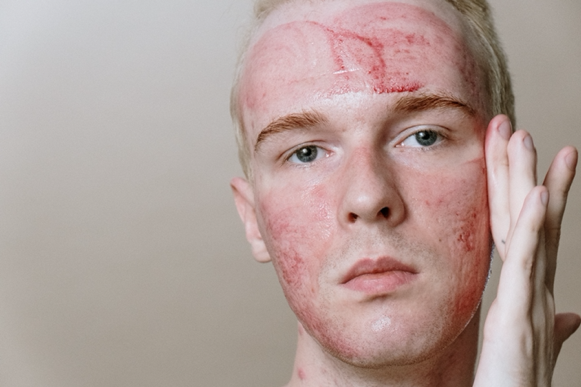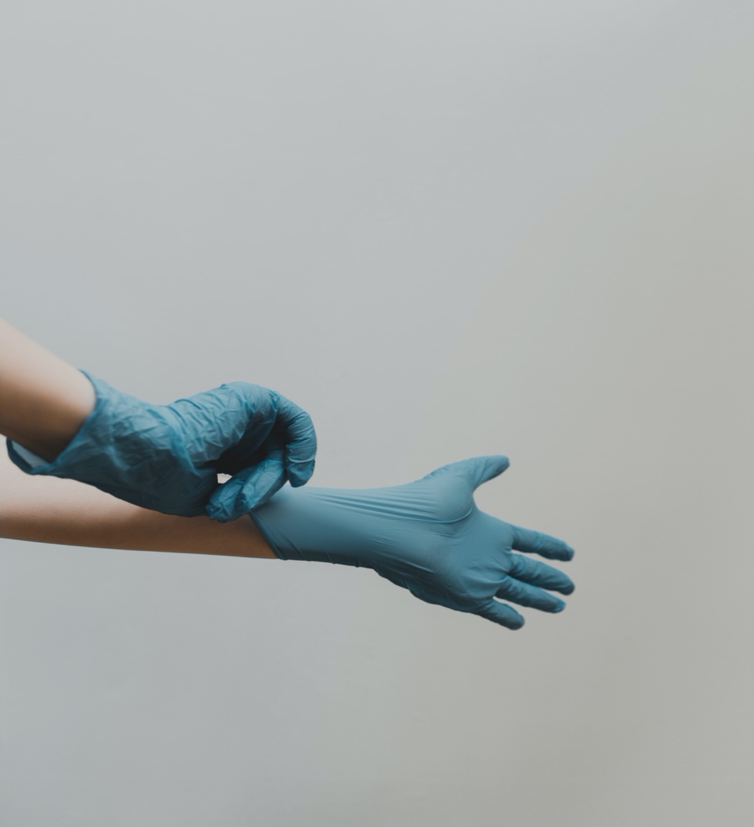Category Archives: Hives
Hives on Face
Can you get hives on the face? Hives are itchy, red skin rashes that appear on your skin. The medical term for hives is urticaria, and they mostly present on the face. Hives on your skin can appear in response of an allergen or sometimes without any cause at all. For those who don’t know, allergen’s cause allergic reactions.
Biological Mechanism
Hives are predominantly an allergic response, and this reaction causes your body to release histamines, which is a protein. When your body releases histamines, the tiny blood vessels under your skin leak a fluid that accumulates in the skin and causes a red itchy rash.
Types of Hives
There are two types of hives, ordinary hives and chronic hives
Ordinary Hives: This type of hives is quite normal in people. You may experience it due to the exposure of certain external stimuli. It lasts a couple of hours and goes away.
Chronic Hives: This type of hives is mostly idiopathic. This means that no one can tell the cause of it and it may even last a couple of months.
Hives on Face: Symptoms
The symptoms of hives include swellings or wheels appearing as a rash on the surface of your skin. They are round in shape and their color is pinkish or red. You will experience extreme itchiness on these rashes as they begin to appear. Furthermore, they are likely to appear on your face in big numbers, and can also show up on your hands, legs, fingers, toes and fee.
Symptoms can normally diminish in 24 hours but there is always a change of re-appearance. They can appear in different parts of the body at the same time. Some people with chronic hives will experience symptoms that could last for months and even years.
Hives on Face: Causes
There are certain causes for hives that are more common than others, these include
Medications
Some people cannot tolerate certain medications and may exhibit an allergic response to them. These medications may include penicillin, aspirin, ibuprofen and blood pressure medications.
Airborne Allergens
Airborne allergens are tiny particles that hover along with the air. Breathing the air that contains these allergens can cause an allergic reaction in the form of hives. These allergens are specific to individuals but the most common ones are pollen and dust particles.
Foods
Some foods can trigger hives in certain people. These include peanuts, eggs, milk, soy and others.
Environmental
Certain environmental stimuli can have adverse affects in the form of hives. These may include over-exposure to sunlight, vibrations by machines, insect bites, stress and certain fabrics of clothing.
Stress
Doctors also link hives with stress. Being stressed out could massively worsen inflammatory responses. Therefore, chronic stress is can ultimately worsen the allergic reaction that is Hives.
Hives on Face: Diagnosis
The doctor is likely to diagnose and treat acute urticaria and chronic urticaria differently. This is because of the pathological differences between them. Chronic hives can be idiopathic and auto immune. This means that no one can tell the cause and the person’s own immune system may be making it worse. While on the other hand, acute urticaria or hives is much less severe and occurs as a response to external factors.
Acute Urticaria Diagnosis
The doctor will diagnose acute Urticaria by simply examining the rashes and ask the patient basic information of the occurrences of this allergic reaction. If the patient is aware of the triggers and has a history of previous occurrences, the health profession will likely appoint the patient to an experienced allergist.
Chronic Urticaria Diagnosis
For this type of Urticaria, the doctors are likely to conduct specific tests on the patients. These may include blood test, liver function test, stool sample test and thyroid test. The doctors conduct these tests to look for any dysfunction or deficiency that a person may have that is causing this issue.
Hives on Face: Treatment
In some cases, taking over the counter drugs can be helpful for people with Urticaria. However, these may only be able to provide temporary relief. While other helpful methods reside in the form of home remedies, these include using cold object to compress your skin. This is helpful because it can alleviate you from the burning and itchy sensation on your skin. There are also anti-itch bathing products, which you can use to minimize this issue. Furthermore, you use many natural anti-inflammatory products to apply on your skin like Aloe Vera.
To Conclude: Consult With Dr. Boyan Hadjiev, NY’s Top Allergist
There are many natural and over the counter options that can provide you with temporary relieve from the hives on your face. However, the best and most efficient solution for acute urticaria is prevention and precaution. Avoiding the stimulus that triggers the allergic reaction should be your first choice of prevention.
If you suffer from hives and want to learn the best options for treatment, contact Dr. Boyan Hadjiev, New York’s most experienced and trusted allergist.
Boyan Hadjiev, MD
30 East 40th Street
(Btwn Madison and Park)
Suite 1200
New York, NY 10016
212-319-5282
Causes of Hives
What are the causes of hives? People suffering from the Hives or Urticaria will feel their skin swell and turn red. You may also feel itchy when your body reacts to allergens without any reason. Allergens are harmless, but our bodies consider them to be threats. This abnormality is still unknown, and there is no cure for allergic reactions other than prevention. When you experience hives, you will feel a burning sensation. Hives can appear throughout your body. These are simply a rash that develops due to an allergic reaction.

(Source)
Symptoms of Hives
Whenever you react to a substance that you are allergic to, you will start experiencing various symptoms, which is the body’s way to indicate that something is wrong. These symptoms are severe itching, stress, change in temperature, painful swelling inside the throat, eyelids, and lips, etc. This condition can be acute or chronic. In a chronic condition, the symptoms become autonomous. However, researchers and immunologists are not yet aware of the real reason for this.
Causes of Hives
When your body considers a harmless substance a threat and signals the body about the threat, it overreacts. Allergens are normal substances such as pollen, latex, some fruits and vegetables. When that substance enters your body, it will signal the antibodies (also known as lysosomes, immune cells, and T-cells).
These cells signal the immune system about the intruder. After that, the body releases histamine and various other chemicals. Due to the secretion of histamine, the inside layer of the skin starts to inflame, and fluid accumulates for protection. Below you can find some of the causes and triggers of the hives.
1. Medications
There are various types of medication that many immune systems do not accept and treat as a harmful substance. This can trigger an allergic reaction, for instance, ACE inhibitors (for high blood pressure), aspirin (and other non-steroidal anti-inflammatory drugs or NSAID), and some antibiotics.
2. Food Items
This is another common cause of hives that triggers the immune system of the body to react—a lot of food items included in this list. However, the items differ among people. For instance, some are allergic to peanut butter, and some react to strawberries. Here are some of the examples of food items that commonly trigger hives:
- Wheat products
- Strawberries
- Eggs
- Food additives
- Shellfish
- Nuts
- Peanut butter
- Rice
3. Infections
Various infections, such as bacterial or viral, can also trigger hives and cause allergic reactions within the body. Some examples of health conditions that trigger hives include the common cold, influenza, hepatitis B, glandular fever, strep throat, and urinary tract infections, etc.
4. Temperature Change
Sometimes when your body temperature suddenly changes, your immune system considers this as a threat and starts reacting. This will trigger the symptoms of hives.
5. Animal Dander
Many people are prone to the dander of animals, such as horses, cats, and dogs. When they come in contact with these animals, they start sneezing, triggering other symptoms.
6. Latex
Latex is a material that comes from the rubber tree contains protein. This protein is synthetic, and when you inhale or even touch the material for so long, your body starts to react to those protein particles.
7. Pollen
This is another common allergen that the body does not accept. You might have noticed that many people start sneezing when they are in the garden with flowers. Even though pollen is harmless to the body, the immune system treats it as a threat.
8. Insect Stings and Bites
When insect bites or sting the surface of the skin, it starts to turn red, itchy and painful for a long time.
9. Plants
Some plants can also trigger an allergic reaction and develop hives. For instance, oil from leaves of the oak, ivy, and nettle tree can cause a reaction.
Other Causes of Hives
Below you will find more causes of hives:
- Exercise
- Scratching
- Water on the skin
- Exposure to sunlight
- Chronic diseases such as lupus or thyroid diseases
- Dust mites
- Intestinal parasites
- Cockroaches and wastage
- Various chemicals

(Source)
Conclusion
It is hard to find the main reason for the reaction. That is why an immunologist will help you in understanding the main cause and finding the best solution to avoid that allergen. If you are looking for an immunologist, you can contact us at 212-319-5282. Dr. Boyan Hadjiev will consult you about your condition and will provide you complete assistance.
Dr. Boyan Hadjiev is a top NYC immunologist who is an expert in identifying and treating diseases related to the immune system. Contact Dr. Hadjiev with a telemedicine live video call session or in person office appointment.
For more information visit our website: https://DrSneeze.com/
Sources:
https://acaai.org/allergies/types-allergies/hives-urticaria
https://www.webmd.com/skin-problems-and-treatments/guide/hives-urticaria-angioedema#1
https://www.medicalnewstoday.com/articles/157260#types
https://www.mayoclinic.org/diseases-conditions/chronic-hives/symptoms-causes/syc-20352719
Chronic Hives: How to Avoid the Triggering Factors
Chronic Hives Explained
Chronic hives, also known as Urticaria, is an itchy rash on the skin that stays for six weeks or more. It is caused by fluid leak from the blood vessels under the skin’s surface. Approximately one in thousand people develop urticaria in any part of their life but this condition is more common in women than men.
Chronic hives can develop anywhere on the skin and are usually red or white in color. The part of the skin where the chronic rash occurs, feels slightly raised. This bump in the skin is called a weal and these are very itchy. The area around a weal becomes inflamed and red as well.
Causes of Chronic Hives
While it is commonly believed that a chronic hive is caused by the release of fluid from blood vessels just under the skin, it is not the only cause. There can be other unidentified triggers as well. For example, it may be due to an autoimmune problem in which the body’s immune system starts causing skin damage. A chronic hive can also develop due to allergy from certain foods, or medicines. Any part of the skin, if firmly stroked, can also cause a chronic hive or exposure to harsh sunlight can have similar effects.
Other Symptoms of Chronic Hives
While the main symptom of a chronic hive is the appearance of bumps on the skin, which are red in color, it will also be very itchy. In some people with a chronic hive, the throat or tongue may also become affected and as a result, swell up. Swelling on the lips and eyelids also occurs in some people.
Avoiding the Triggering Factors
To avoid the triggers of chronic hives, you must know if there are certain foods that cause it or some other reason, which you can then start avoiding. However, be aware that alcohol and spicy foods can be the triggers as they cause the blood vessels to widen. Some foods also contain pseudoallergens, which cause the release of histamine in the body that has the same effect as alcohol on blood vessels.
It is impossible to avoid the large variety of foods that contain psuedoallergens so diet changes aren’t a good option when it comes to avoiding triggering factors of chronic hives. To rule out the foods that can cause the condition, you can however, keep a log of your symptoms and the foods that you ate at the time. It is advisable to avoid any foods that you suspect cause changes to your skin.
Some other things you can try to avoid the triggers is to avoid wearing tight clothes, staying cool and avoiding hot weather, and protecting yourself from the sun.
If you would like to rule out the possibility that you have chronic hives or want to discuss your symptoms, contact us at 212-319-5282 to book your appointment with a NYC allergist who can help diagnose and treat the condition rightly.
Serving all of New York City and the Tri State Area including Zip Codes: Top Allergist NYC Midtown, Chelsea and Clinton: 10001, 10011, 10018, 10019, 10020, 10036 | Gramercy Park and Murray Hill: 10010, 10016, 10017, 10022 | Greenwich Village and Soho: 10012, 10013, 10014 | Lower Manhattan: 10004, 10005, 10006, 10007, 10038, 10280 | Lower East Side: 10002, 10003, 10009 | Upper East Side: 10021, 10028, 10044, 10128 | Upper West Side: 10023, 10024, 10025


